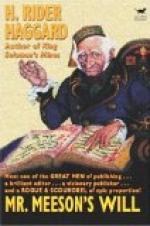As soon as the Judge had come in, Augusta resumed her place in the witness-box, and the Attorney-General rose to cross-examine her.
“You told the Court, Miss Smithers, at the conclusion of your evidence, that you are now engaged to be married to Mr. Meeson, the plaintiff. Now, I am sorry to have to put a personal question to you, but I must ask you—Were you at the time of the tattooing of the will, in love with Mr. Meeson?”
This was a home-thrust, and poor Augusta coloured up beneath it; however, her native wit came to her aid.
“If you will define, Sir, what being in love is, I will do my best to answer your question,” she said. Whereat the audience, including his Lordship, smiled.
The Attorney-General looked puzzled, as well he might; for there are some things which are beyond the learning of even an Attorney-General.
“Well,” he said, “were you matrimonially inclined towards Mr. Meeson?”
“Surely, Mr. Attorney-General,” said the Judge, “the one thing does not necessarily include the other?”
“I bow to your Lordship’s experience,” said Mr. Attorney, tartly. “Perhaps I had better put my question in this way—Had you, at any time, any prospect of becoming engaged to Mr. Meeson?”
“None whatever.”
“Did you submit to this tattooing, which must have been painful, with a view of becoming engaged to the plaintiff?”
“Certainly not. I may point out,” she added, with hesitation, “that such a disfigurement is not likely to add to anybody’s attractions.”
“Please answer my questions, Miss Smithers, and do not comment on them. How did you come, then, to submit yourself to such a disagreeable operation?”
“I submitted to it because I thought it right to do so, there being no other apparent means at hand of attaining the late Mr. Meeson’s end. Also”—and she paused.
“Also what?”
“Also I had a regard for Mr. Eustace Meeson, and I knew that he had lost his inheritance through a quarrel about myself.”
“Ah! now we are coming to it. Then you were tattooed out of regard for the plaintiff, and not purely in the interests of justice?”
“Yes; I suppose so.”
“Well, Mr. Attorney,” interposed the Judge, “and what if she was?”
“My object, my Lord, was to show that this young lady was not the purely impassive medium in this matter that my learned friend, Mr. Short, would lead the Court to believe. She was acting from motive.”
“Most people do,” said the Judge drily. “But it does not follow that the motive was an improper one.”
Then the learned gentleman continued his cross-examination, directing all the ingenuity of his practised mind to trying to prove by Augusta’s admissions, first, that the testator was acting under the undue influence of herself; and secondly, that when the will was executed he was non compos mentis. To this end he dwelt at great length on every detail of the events between the tattooing of the will and the death of the testator on the following day, making as much as was possible out of the fact that he died in a fit of mania. But do what he would, he could not shake her evidence upon any material point, and when at last he sat down James Short felt that his case had not received any serious blow.




